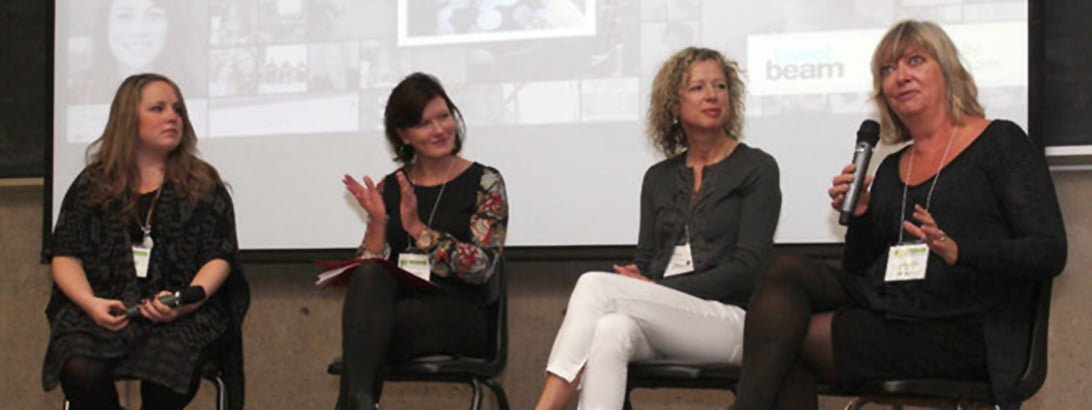During the Niagara Leadership Summit for Women, a panel discussion was held featuring local female leaders, from left, Allie Hughes, owner of Hughes & Co.; Debbie Zimmerman, CEO of Grape Growers of Ontario and former regional chair; Mishka Balsom, CEO of Greater Niagara Chamber of Commerce; and Tami Jeanneret, 105.7 EZ Rock news anchor and Niagara College instructor. The panel was held on Saturday, Oct. 24, 2015, in St. Catharines, Ont. Maryanne Firth, St. Catharines Standard.
There has been a lot of talk since the federal election ended about Prime Minister-designate Justin Trudeau’s desire to bring a degree of gender balance to his cabinet.
For those of you who are about to cry “Oh, no, not more political correctness,” what Trudeau is talking about is addressing the very real and, in 2015, disgraceful gender imbalance in our political life.
Even in an era when electing a female premier is about as controversial as saying the snow is cold, the reality is politics in Canada is still dominated by men.
Consider the candidates who ran for a Niagara seat in the 2015 federal election for the major parities.
Twelve candidates ran in four Niagara ridings representing the Liberals, the Conservatives and the NDP. Of these candidates, only three were women.
Sue Erskine-Fournier ran for the NDP in St. Catharines, Carolynn Ioannoni was the NDP candidate in Niagara Falls and Leanna Villella was the Tory hopeful in Niagara Centre.
This trio of candidates, given the state of the polls then, looked to have a half-way decent shot at winning. But things change, and none of them did.
The individual campaigns were problematic. Erksine-Fournier allowed her Tory and Liberal opponents to dominate candidates debates. Villella couldn’t answer questions about key Conservative foreign policy decisions and despite being an established a political figure Niagara Falls, Ioannoni couldn’t get the traction needed to unseat the Tory incumbent.
Mind you, all of that has nothing to do with gender. You could say similar things about all the losing – and even the winning – campaigns .
It is absolutely not the case that Niagara is bereft of female political talent. Consider Jennifer Mooradian for instance, who once ran for the Green Party in St. Catharines. She was without a doubt the best candidate the Greens have ever fielded in St. Catharines, out gunning opponents in candidates debates. She ultimately lost, however, because she hitched her wagon to a party on the fringes.
She isn’t alone. If you look around the region, there are talented women in leadership positions in many sectors. But very few will run for federal office.
When you step back from the election, and look at the political gender break down in the region — discussed last week at the Niagara Leadership Summit for Women — the situation becomes even more clear and may explain why only three women chose to dive into into the federal election meat grinder
A mere 13% of Niagara Region councillors are women. That proportion is only slightly better at the House of Commons, with 26% of MPs being women.
This data is reflective of a broader trend that should come as no surprise to anyone who has paid the least bit of attention to our culture in the last 40 years.
Women make up about 48% of the total work force, but they only 5% of the top jobs. While the wage gap has improved, women on the whole still get paid less than their male counterparts doing the same job.
We have several female premiers but they govern cabinets mostly made up of men.
I’m certain this is a gross simplification, but these stats do bespeak the cultural road-blocks preventing women from running for high office. Lack of respect and not being taken seriously, the wage gap, and outmoded ideas of where a woman’s “place” ought to be, all likely play a role.
(The sad bit here is that men who hold office have marriages and kids, and yet no one questions when they want to put much of their lives on hold to run.)
As manifestly unbalanced as that is, these culturally assigned gender roles exist. They won’t change just by saying “that’s unfair.”
Women will often carry more responsibility when it comes to caring for a home or children. And our political infrastructure isn’t really set up to help women manage that while that while taking on the extra and stressful duties of a politician.
That has to change.
Because the thing is if we don’t change it, we are overtly rejecting half the population — and the intelligence, creativity and ideas they could bring to bear on a host of issues the nation faces — as essentially unfit for office.
Which seems like a colossally bad idea.
Original article: http://www.niagarafallsreview.ca/2015/10/26/lafleche-the-politics-of-gender-and-elections



